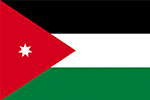
Population
10M+
CHRISTIAN PERSECUTION STATUS
minimal
Freedom
CHRISTIAN POPULATION
2%
Status of
the church
The population of Jordan is 96% Muslim (majority Sunni), with a 2% Christian minority. Its constitution recognizes freedom of religion, but public gatherings still require permission from state authorities. There are many unregistered fellowships.
There are few reports of blatant discrimination against Christians in Jordan, although tolerance tends to extend only to foreign Christians. There remains much social discrimination against new believers and local Christians.
In addition to Jordan’s population of 10.5 million, the nation has an average of 2 million Palestinian refugees and 500,000 Iraqi refugees. The outbreak of civil war in Syria brought over 650,000 Syrian refugees to Jordanian soil. This large number of displaced people with varying political backgrounds has resulted in many problems for the Jordanian authorities. Jordan recently began revoking the citizenships of hundreds of Palestinian refugees for fear that Israel will use this as a basis to relocate all Palestinians from Gaza and the West Bank to Jordan. (Middle East Concern).
Jordan has a 95.4% average literacy rate (CIA World Factbook).
Location
Prayer points
What our viewers are saying